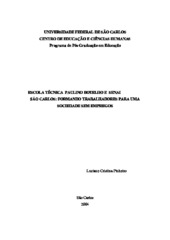| dc.contributor.author | Pinheiro, Luciane Cristina | |
| dc.date.accessioned | 2016-06-02T19:39:59Z | |
| dc.date.available | 2006-02-13 | |
| dc.date.available | 2016-06-02T19:39:59Z | |
| dc.date.issued | 2004-12-16 | |
| dc.identifier.uri | https://repositorio.ufscar.br/handle/ufscar/2787 | |
| dc.description.abstract | In this dissertation, an analysis of the three last decades of the 20th century was done, with an
emphasis in the trial of productive reconstruction and the new liberalism reforms and its impact in the
education, especially to the workers technical-professional formation.
In that sense we are going to show that the real capitalism lives a moment of structural crisis, what carries its
ideologists and spokesmen of the status quo. It will create powerful ideologies that decree the “end of the
history”, give “good-bye to the proletariat” and celebrate a new society, the “society of knowledge”.
The direct impact of such ideologies in the education has been the need of its attribute to the schools,
especially to the technical education and the formation of new persons, who will be: supportive, adaptive,
participative, autonomous, creative. In short, more connive with the needs of the output capitalist and of the
new social pact that encloses itself at the present.
In a society marked by massive unemployment, precarious actions of the relations of work, misery increase,
intolerance, drugs trafficking, and mainly, in a moment of structural crisis of the capitalism, we look to
attribute to the individual, the continuous capacity of adaptabilities of a deeply uneven society, substantiated
in antagonizing and conflicting classes.
The new face of theory of the human capital, the employability, upon transferring to the individual the gross
responsibility about the “management of his career”, ends up conferring him the obligation to be capable to
resolve conflicts of any dimension, from structural unemployment to the problems of social and political
order.
We show that such ideologies are barely going to guarantee the permanence of the society of bourgeois
classes, as well as, upon legitimizing a perverse social order, the alienates and the excluded, make it possible
of any radical change in any given situation.
We also demonstrate that today, capitalism only can continue existing upon shielding itself under strong stateowned
protection, or rather, the State became, “real”, in the beginning of this century, “the armed arm of the
bourgeois”. | eng |
| dc.description.sponsorship | CAPES - Coordenação de Aperfeiçoamento de Pessoal de Nível Superior | |
| dc.language | por | por |
| dc.publisher | Universidade Federal de São Carlos | por |
| dc.rights | Acesso Aberto | por |
| dc.subject | Educação para o trabalho | por |
| dc.subject | Política educacional | por |
| dc.subject | Ensino profissional – curso técnico | por |
| dc.subject | Desemprego | por |
| dc.subject | Neoliberalismo | por |
| dc.title | Escola Técnica Paulino Botelho e SENAI São Carlos: formando trabalhadores para uma sociedade sem empregos | por |
| dc.type | Dissertação | por |
| dc.contributor.advisor1 | Tagliavini, João Virgílio | |
| dc.contributor.advisor1Lattes | http://lattes.cnpq.br/1979817459932992 | por |
| dc.description.resumo | Na presente dissertação é feita uma análise das três últimas décadas do século XX,
com ênfase no processo de reestruturação produtiva e nas reformas neoliberais e o seu
impacto na educação, em especial à formação técnico-profissionalizante de trabalhadores.
Nesse sentido procuramos mostrar que o capitalismo real vive um momento de crise
estrutural o que leva seus ideólogos, porta vozes do status quo, a criarem ideologias
poderosas, que decretam o “fim da história”, dão “adeus ao proletariado” e celebram uma
nova sociedade, a “sociedade do conhecimento”.
O impacto mais direto de tais ideologias na educação tem sido a necessidade de se
imputar à escola, em especial ao ensino técnico-profissional, a formação de um novo ser
social: solidário, adaptativo, participativo, autônomo, criativo, em suma, mais conivente
com as necessidades da produção capitalista e do novo pacto social que se encerra
atualmente.
Em uma sociedade marcada por desemprego massivo, precarização das relações de
trabalho, aumento da miséria, da intolerância, do tráfico de drogas , e, principalmente, num
momento de crise estrutural do capitalismo, busca-se atribuir ao indivíduo a capacidade
contínua de adaptabilidade à uma sociedade profundamente desigual, fundamentada em
classes antagônicas e conflitantes.
A neoteoria do capital humano, a empregabilidade, ao transferir para o indivíduo a
total responsabilidade sobre o “gerenciamento de sua carreira”, acaba por lhe conferir a
obrigação de ser capaz de resolver conflitos de toda ordem, desde o desemprego estrutural
até problemas de ordem política e social.
Mostramos que tais ideologias apenas pretendem garantir a permanência da
sociedade de classes burguesa, bem como, ao legitimarem uma ordem social perversa,
alienante e excludente, impossibilitam qualquer mudança radical nesse estado de coisas.
Mostramos, também, que o capitalismo hoje só pode continuar existindo ao escudar-se sob
forte proteção estatal, ou seja, o Estado tornou-se, verdadeiramente, nesse início de século,
“o braço armado da burguesia”. | por |
| dc.publisher.country | BR | por |
| dc.publisher.initials | UFSCar | por |
| dc.publisher.program | Programa de Pós-Graduação em Educação - PPGE | por |
| dc.subject.cnpq | CIENCIAS HUMANAS::EDUCACAO::FUNDAMENTOS DA EDUCACAO | por |
| dc.contributor.authorlattes | http://lattes.cnpq.br/8687599935573615 | por |
